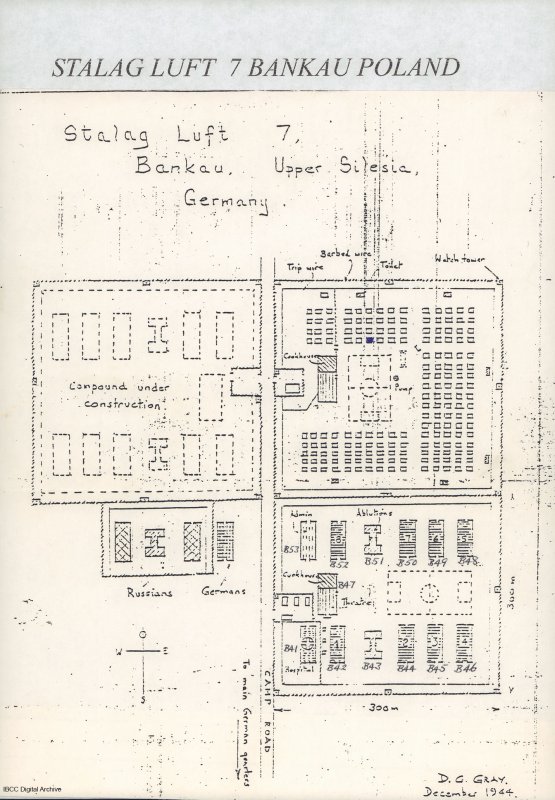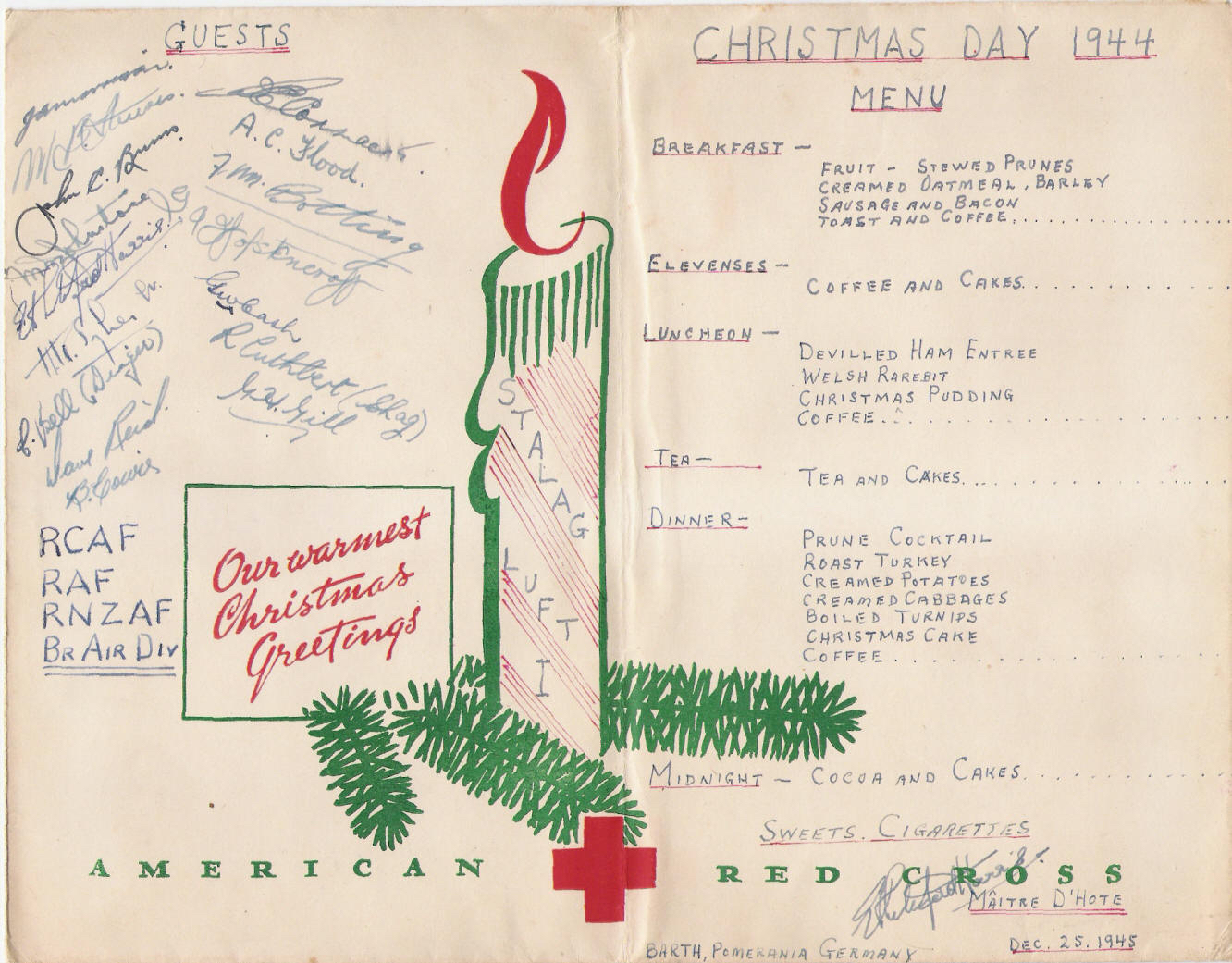Documents
F/O George Leslie Smith [click to enlarge]
Sgt. William Jon Henderson
Sergeant Gold [click to enlarge]
[click to enlarge]
[click to enlarge]
Flight Sergeant Howard McNeill Kiddie RCAF
[click to enlarge]
Mme Nicole Lie, mayor of Clarbec Il y a 80 ans, pendant la nuit des 7-8 août 1944, en pleine bataille de Normandie, un bombardier Lancaster de la Royal Air Force britannique est En tant que maire de la Commune de Clarbec je suis particulièrement touchée par la présence à côté de moi aujourd’hui des membres des familles de trois de ces courageux aviateurs, qui sont venus exprès d’Angleterre et des Etats-Unis pour honorer le pilote French et je les remercie au nom de tous les Clarbecquois. Il s’agit des familles du Lieutenant French (pilote), du navigateur Smith et du mitrailleur Gold. Après avoir bombardé la cible autour de Falaise, l’avion a été touché par des tirs anti-aériens autour du Havre et puis endommagé par un chasseur de nuit allemand. Le Lieutenant French a donné l’ordre d’évacuer l’avion et il est resté aux commandes pour permettre à ses six co-équipiers de sauter. Quatre d’entre eux ont réussi - avec l’aide des habitants de Clarbec et d’autres communes - à s’évader et rejoindre les lignes britanniques. Deux ont été capturés et envoyés dans des camps pour prisonniers. Mais tous les six ont survécu. Le Lieutenant French, notre pilote anglais, est enterré ici dans une tombe de guerre que nous entretenons avec respect et avec gratitude. Il a sacrifié sa vie pour que ses amis puissent survivre et pour que la France puisse être libérée. Il avait 21 ans. Souvenons-nous. Je passe la parole au Lieutenant McKie-Smith, fils du navigateur et lui-même, comme son père, ancien officier de la Royal Air Force. Stuart McKie-Smith (retired Flight Lieutenant RAF and son of the navigator) My name is Stuart, I am the son of the Navigator Flying Officer George Leslie Smith. My father began flying with Flight Lieutenant Leonard Arthur French, and the Lancaster bomber crew, in February 1944 before I was born. I have also served in the Royal Air Force as a navigator and a Flight Lieutenant, I know the strength of the bond the crew would have formed through their trust and dependency on each other to operate the aircraft as a crew. The relationship between a navigator and a pilot is particularly crucial, and my father always spoke very highly of Flight Lieutenant French who he knew as ‘Len’ My father described how after around 5 minutes of leaving the bombing target, the bomb aimer reported seeing flak on the port side of the aircraft. After a few seconds the port wing received a direct hit and immediately caught fire, followed by the explosion of the fuel tank. He described how the pilot and the engineer tried to put the fire out without success, and Flight Lieutenant French giving the orders to the crew to abandon the aircraft. My father described how he left his seat to go to the escape hatch, the horrible dive and shuddering of the aircraft and the silhouette of Flight Lieutenant French against the glow of the flames from the port wing. He said he saw the look of determination on the face of Flight Lieutenant French, as he held the stick back to prevent the aircraft spinning out of control. My father said Flight Lieutenant French must have known his chances of escape were hopeless as he was sitting on his parachute, and that it was through his determination that the rest of the crew were able to escape with their lives. My father was knocked unconscious during his parachute descent, and woke up after landing in an orchard. For the next 10 days, with the very courageous help of Roland Deliquaire and others from the local community, my father evaded capture by the occupying German forces. The Germans retreated and the advancing Allies arrived in the area where my father was hiding on 19 August 1944. A few days later my father, along with 3 of the other crew members who also evaded, was flown back to England. He was treated in hospital for an injury to his spine during his parachute landing and reunited at home with my mother and sister in September 1944. I was born in June 1945; I have 2 children and 4 grandchildren. I am grateful and honoured to be here to pay my respects and gratitude to Flight Lieutenant French in remembrance of his bravery, and others who helped my father. Len gave his life to ensure the survival of others. We will never forget. Richard Grant (son of Sergeant Gold, tail-gunner) Ladies and Gentlemen, Mesdames et Messieurs, My father was Charles Gold, the rear gunner on Lancaster Bomber LM111 He was a quiet man who never went into great detail about his wartime experiences. My late sister and I knew that his plane was shot down over France and he’d been injured during his parachute fall. He told us that he was thankfully picked up by the Resistance, who arranged surgery by candlelight on his injury. And that’s about as much as we knew. Following his death in 1990 I went through a box of his belongings which included his wartime effects but had no idea of the history behind these. About 6 years ago when the 75 th anniversary of D-Day wasn’t far off, I was taking another look through his documents and out of curiosity decided to Google the registration LM111. And I then came across the website The Mission created by Nick McKie-Smith, detailing the exploits of his grandfather George Leslie Smith, the plane’s navigator. And I started then to learn about the history of that ill-fated Lancaster and it’s crew. I sent a comment to Nick, identifying myself, and the story has just escalated from there. Since then, with the aid of my father’s RAF flight logbook, and Evasion Report from the War Office, and with the invaluable detailed research carried out by Roger Brawn, so much more information has come to light, not only about my father’s re-patriotization, but also about Leonard French, the pilot. My father flew more than 20 missions during the war, from initial training up to that final one, in August 1944, and in nearly all of them, his pilot was Leonard French. I’d never heard that name mentioned by my father, but the two of them must have built up a great friendship and camaraderie. And had it not been for the courage and bravery of Fl/Lt French in keeping the plane flying, enabling his crew to bale out, I and my family would probably not be here today. So, a very heart felt thank you, Leonard French. Becca French and James Brookbank (niece and nephew of Leonard Arthur French) Speech for Leonard French commemoration Hello everyone, we are the niece and nephew of Leonard French and it’s a great honor for us to represent him for this event We wanted to say a few words in his memory and commemorate his passing. Leonard gave his life 80 years ago in the plane that crashed near here, and bravely sacrificed himself to save his crew. We are extremely grateful that we have been able to reconnect today with some of the crew members' family and we want to say a special thank you to Roger for helping to make this all happen A big thank you to those of you who traveled here today, and a big thank you as well for those who have organized this anniversary event. We really appreciate the time and effort that has been put in over the years in maintaining the site and it’s great to see this commemorative plaque which helps tell the story to a new generation Leonard’s sister Irene was gathered here thirty years ago, since then she has passed on and we are honored to be able to continue that legacy of remembrance for Leonard and all those who made the ultimate sacrifice so that we can be here today. Best said with a short reading from the war poet Laurence Binyon They went with songs to the battle, they were young, Straight of limb, true of eye, steady and aglow. They were staunch to the end against odds uncounted; They fell with their faces to the foe. They shall grow not old, as we that are left grow old: Age shall not weary them, nor the years condemn. At the going down of the sun and in the morning We will remember them. version française McKie-Smith « Mon nom est Stuart. Je suis le fils du navigateur George Leslie Smith. Mon père commença à voler avec le lieutenant Leonard Arthur French et l’équipage du bombardier Lancaster en février 1944, avant ma naissance. J’ai moi-même servi dans la « Royal Air Force » comme navigateur et capitaine d’aviation et je connais bien la force des liens que l’équipage aurait forgés grâce à la confiance et la dépendance l’un envers l’autre pendant de telles missions. La relation entre un navigateur et un pilote est cruciale et mon père a toujours dit le plus grand bien du Lieutenant Arthur French, qu’il appelait Len. Mon père racontait qu’environ 5 minutes après avoir quitté la zone cible, le bombardier signala des tirs anti-aériens à bâbord de l’appareil. Quelques secondes plus tard l’aile bâbord était touchée et a immédiatement pris feu, suivi par l’explosion du réservoir de carburant. Il expliquait que le pilote et le mécanicien navigant ont tenté, sans succès, d’éteindre l’incendie et que le Lieutenant French donna ordre à l’équipage d’abandonner l’appareil. Mon père racontait comment il avait quitté son siège pour se diriger vers la trappe d’évacuation, et l’horrible descente, les vibrations de l’appareil ainsi que la silhouette du Lieutenant French qui se détachait sur les flammes de l’incendie. Il dit avoir vu la détermination sur le visage du Lieutenant French alors qu’il tirait le manche vers lui pour éviter que l’avion ne parte en vrille. Selon mon père, le Lieutenant French savait que ses chances de survie étaient nulles car il était assis sur son parachute, et que c’est grâce à sa détermination que l’équipage a pu survivre. Mon père a perdu connaissance lors de la descente en parachute et s’est réveillé après avoir atterri dans un verger. Au cours des 10 jours suivants mon père a évité d’être capturé par les forces d’occupation allemandes grâce à l’aide et au courage de Roland Deliquaire et d’autres membres de la communauté locale. Les habitants ont risqué leur vie pour aider et cacher mon père. Ils lui ont donné nourriture, eau et abri. Une fois on le cacha dans une cheminée, une autre fois dans une malle dans un grenier juste au-dessus de soldats allemands qui avaient réquisitionné les bâtiments de la propriété. Les allemands ont battu en retraite et les alliés sont arrivés dans la région où mon père se cachait le 19 août 1944. Quelques jours plus tard mon père et 3 autres membres de l’équipage qui s’étaient également échappés furent rapatriés en Angleterre. Mon père fut hospitalisé pour une blessure à la colonne vertébrale subie lors de son atterrissage. Il retrouva ma mère et ma sœur en septembre 1944. Je suis né en juin 1945, j’ai 2 enfants et 4 petits enfants. Je suis reconnaissant, et c’est un honneur pour moi d’être ici pour rendre hommage et témoigner de ma gratitude envers le Lieutenant French en souvenir de sa bravoure, et envers tous ceux qui ont aidé mon père. Len a donné sa vie pour la survie des autres. Richard Grant « ?Ladies and Gentlemen, Mesdames et Messieurs Mon père Charles Gold, était mitrailleur arrière sur le bombardier Lancaster LM111. C’était un homme discret qui n’a jamais beaucoup parlé des expériences qu’il a vécues durant la guerre. Ma défunte sœur et moi savions que son appareil avait été abattu au-dessus de la France et qu’il avait été blessé lors de sa descente en parachute. Il nous a raconté qu’heureusement il fut recueilli par la Résistance qui fit le nécessaire pour que sa blessure soit soignée à la lueur des bougies! C’est à peu près tout ce que nous savions. Après sa mort en 1990, j’ai trouvé dans une boîte de ses effets personnels, des souvenirs de guerre dont je ne connaissais pas l’histoire. Depuis, son carnet de vol de la RAF, le rapport d’évasion du War Office et les recherches détaillées de Roger Brawn on révélé encore plus de détails, non seulement sur le rapatriement de mon père mais aussi sur le Lieutenant French. Mon père a effectué plus de 20 missions, de l’entraînement initial jusqu’à son dernier vol le 7 août 1944, et la plupart furent pilotés par le Lieutenant French. Il n’a jamais prononcé son nom mais ils ont dû forger une solide amitié et camaraderie. Et sans le courage et la bravoure avec lesquels le Lieutenant French a maintenu l’appareil en vol permettant à l’équipage de sauter, ma famille et moi ne serions probablement pas ici aujourd’hui. Du fond du cœur, merci Lieutenant French. » Becca French/James Brookbank « Bonjour, Nous sommes la nièce et le neveu de Leonard French et c’est un grand honneur pour nous de le représenter lors de cet événement. Leonard a donné sa vie il y a 80 ans dans l’avion qui s’est écrasé près d’ici et s’est courageusement sacrifié pour sauver son équipage. Nous sommes extrêmement reconnaissants de pouvoir renouer aujourd’hui avec les familles de certains des membres de l’équipage et remercions Roger d’avoir contribué à cette rencontre. Nous apprécions le temps et les efforts consacrés au cours des années à la préservation du site et sommes heureux de voir cette plaque commémorative qui contribuera à transmettre cette histoire à la nouvelle génération. La sœur de Leonard s’est recueillie ici il y a 30 ans. Maintenant décédée, nous sommes honorés de poursuivre la tradition du souvenir au nom de tous ceux qui ont fait l’ultime sacrifice pour que nous soyons ici aujourd’hui, comme le dit si bien ce poème de Laurence Binyon: Pour les soldats tombés Ils sont partis en chantant au combat, ils étaient jeunes, Ils ne vieilliront pas, comme nous qui sommes restés vieillirons
Evasion Reports

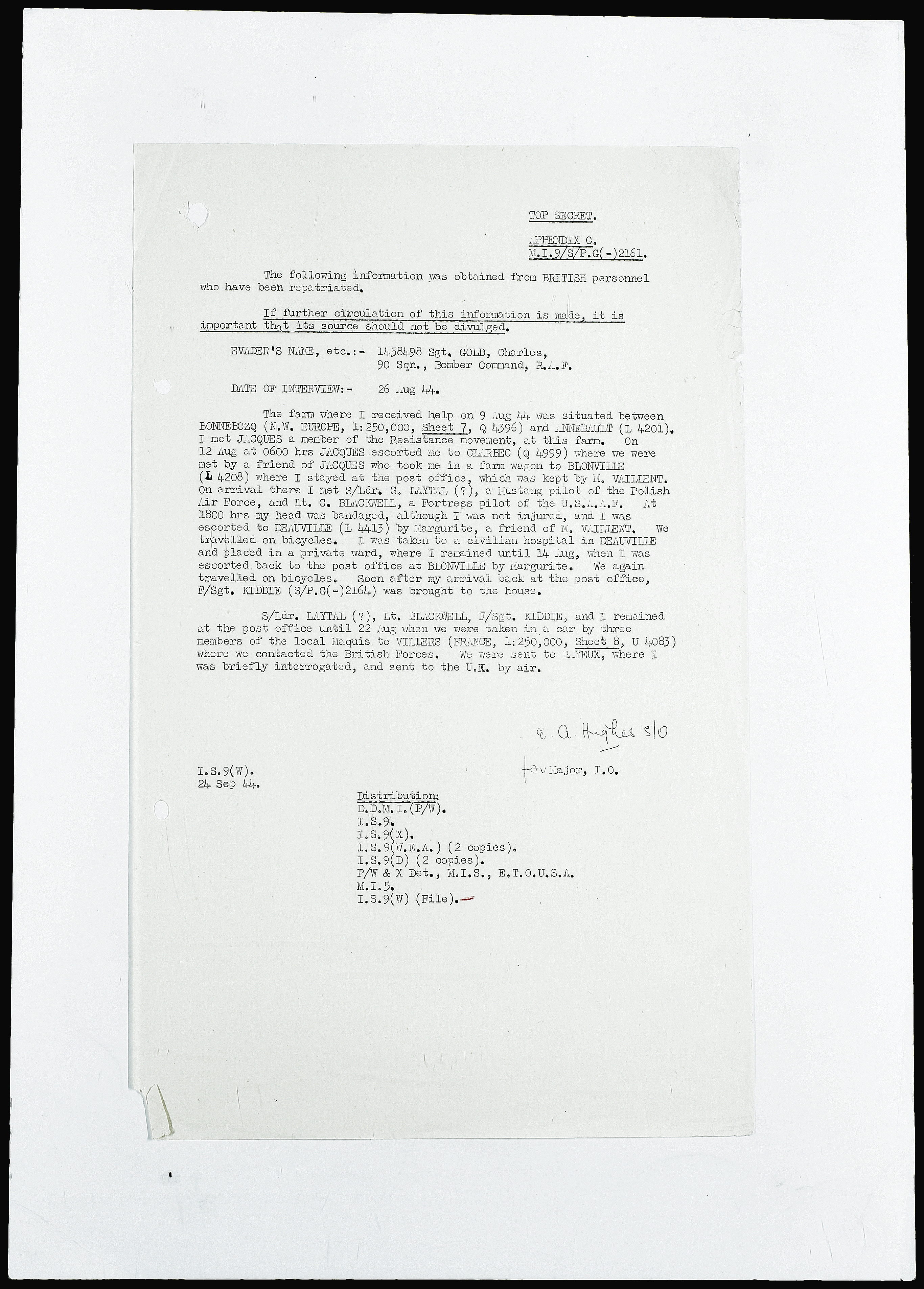
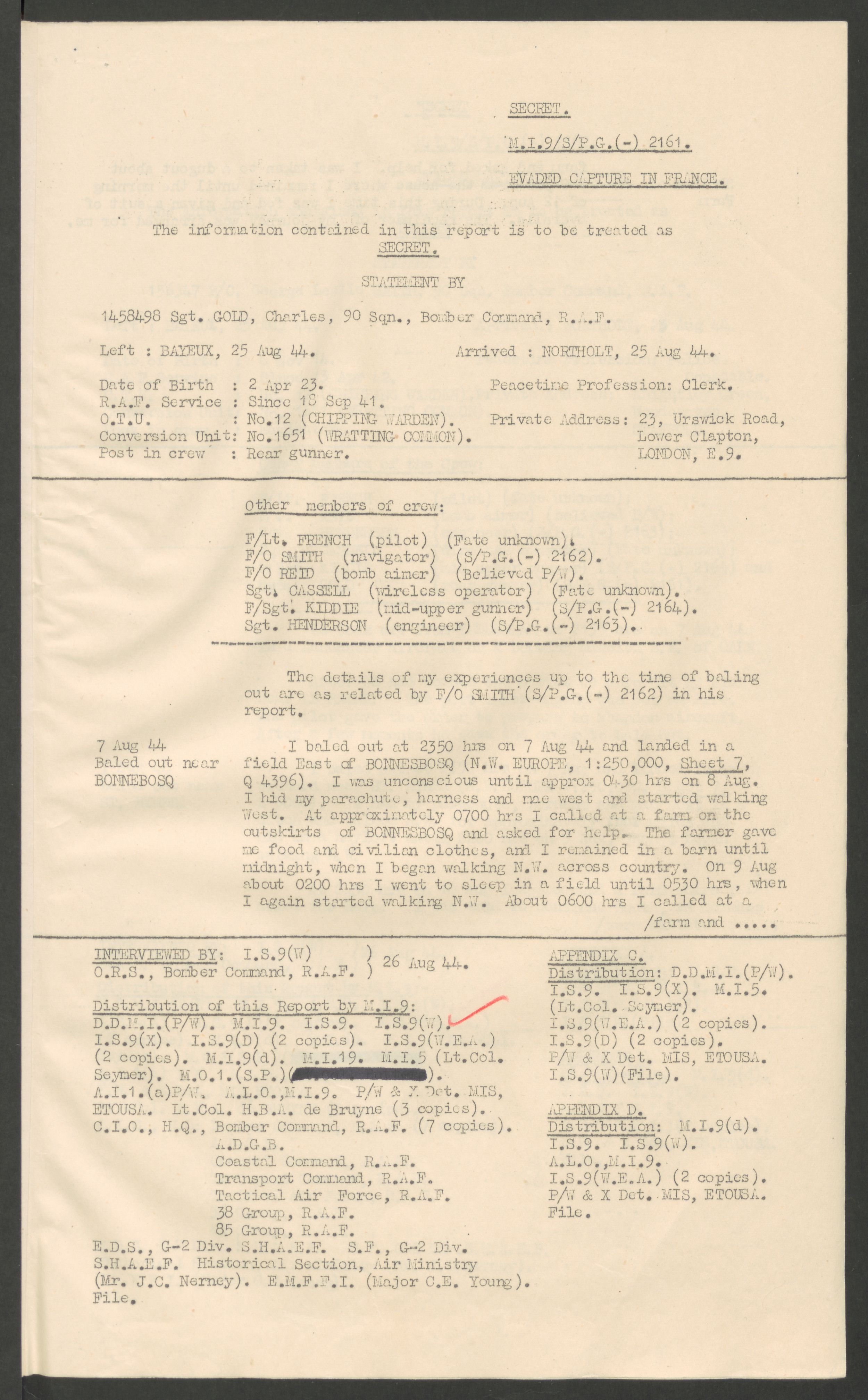
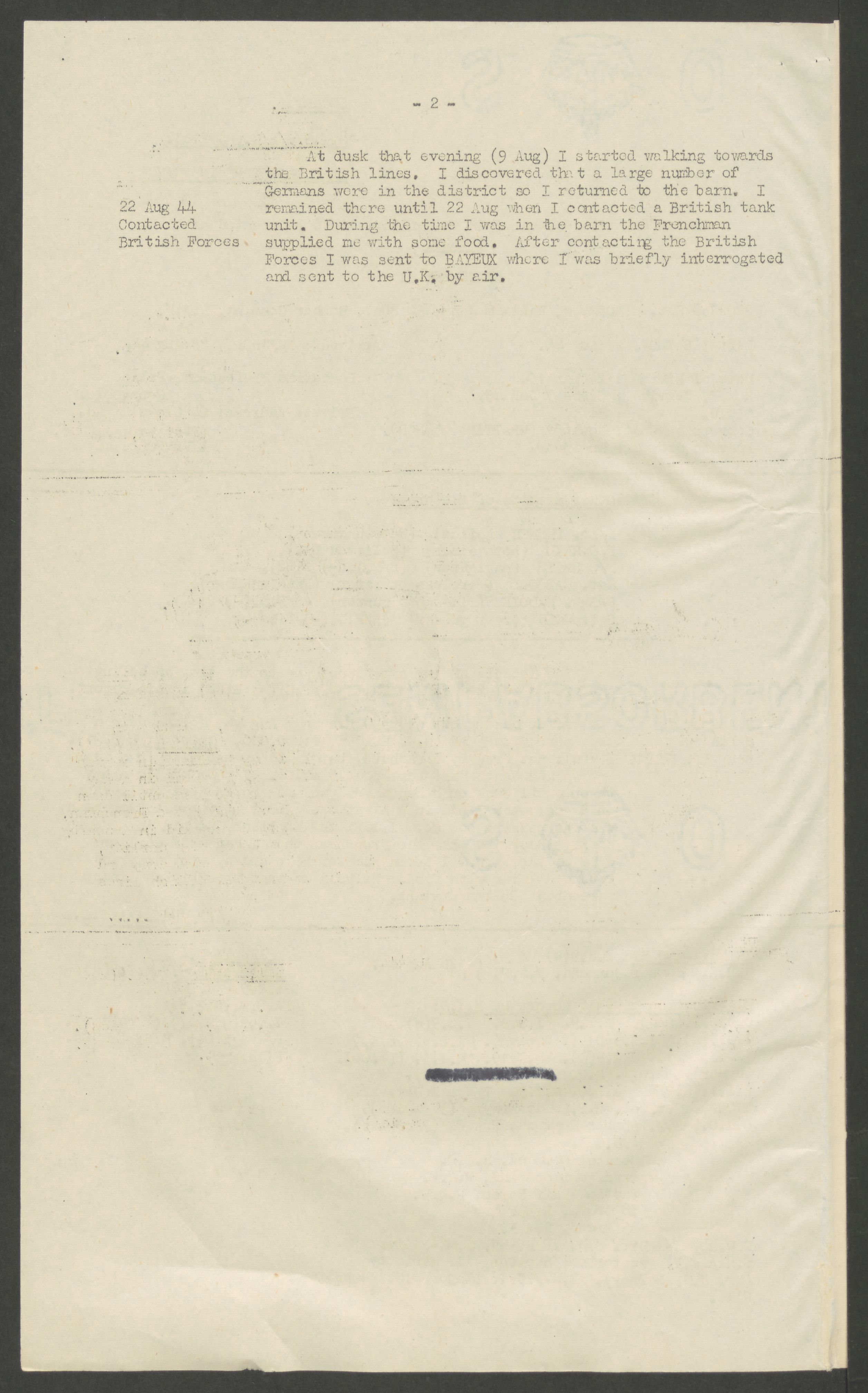
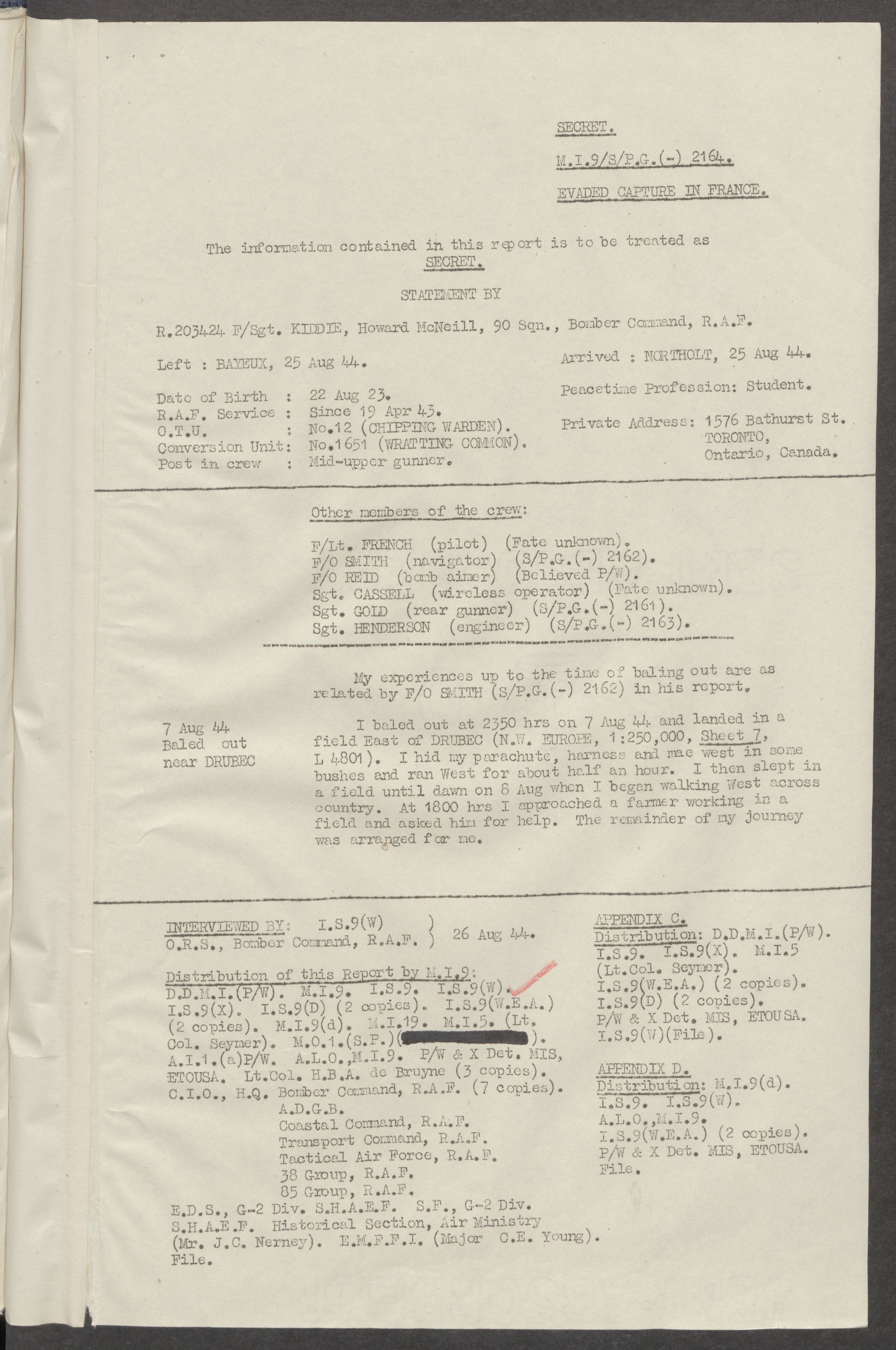
Lancaster
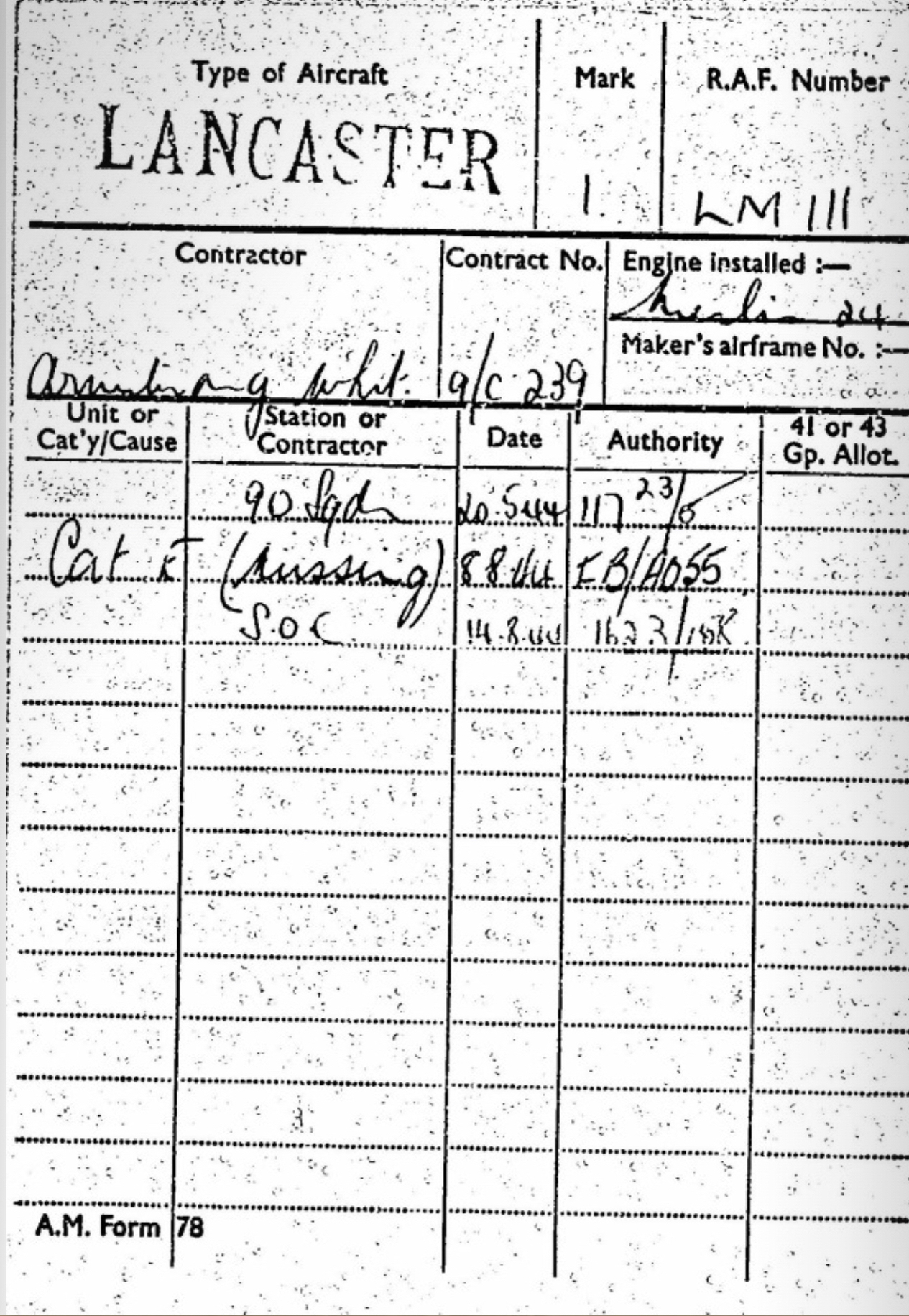
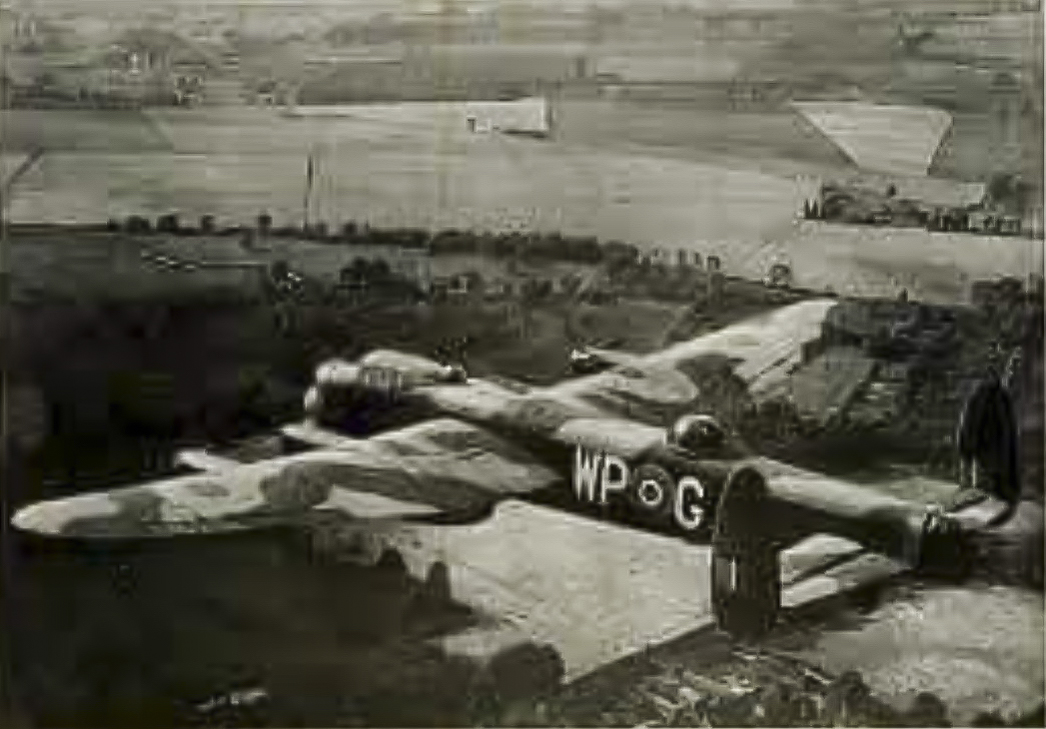
Speeches at the Clarbec commemoration on 3 August 2024
tombé ici chez nous à Clarbec.
The local people risked their lives to help and hide my father and gave him food and water and shelter. On one occasion they hid him in a chimney, and on another in a chest in a loft above German soldiers who were billeted in the buildings of the property.
Jamais, nous ne l’oublierons. »
Il y a environ 6 ans, alors que le 75 ème anniversaire du Jour J approchait, j’ai regardé à nouveau ces documents et par curiosité j’ai fait une recherche sur Google avec le numéro LM111 de l’appareil. J’ai découvert le site « The Mission » créé par Nick McKie-Smith relatant les exploits de son grand père George Leslie Smith, le navigateur de l’appareil. C’est ainsi que j’ai découvert la malheureuse histoire de ce Lancaster et de son équipage. J’ai envoyé un mot à Nick en expliquant qui j’étais et c’est comme ça que tout a commencé.
Nous tenions à dire quelques mots à sa mémoire et pour commémorer son décès.
Un grand merci à ceux d’entre vous qui ont fait le déplacement ici, et à ceux qui ont organisé cette commémoration.
Plein de vie, l’œil vif, forts et rayonnants.
Ils furent courageux jusqu’à la fin contre d’innombrables défis,
Ils sont tombés leurs visages tournés vers l’adversaire.
L’âge ne les usera pas, ni même le poids des années.
Au coucher du soleil et le matin,
Nous nous souviendrons d’eux. »

